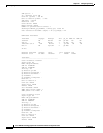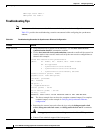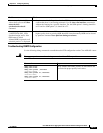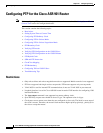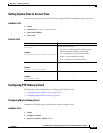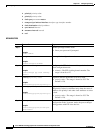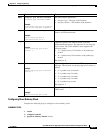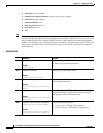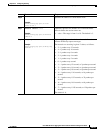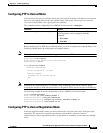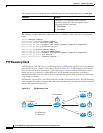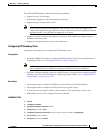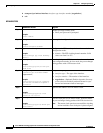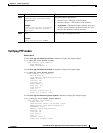
22-22
Cisco ASR 901 Series Aggregation Services Router Software Configuration Guide
OL-23826-09
Chapter 22 Configuring Clocking
Configuring PTP for the Cisco ASR 901 Router
4. clock-port port-name slave
5. transport ipv4 unicast interface interface-type interface-number
6. clock source source-address
7. announce timeout value
8. delay-req interval interval
9. sync interval interval
10. end
Note PTP redundancy is an implementation on different clock nodes by which the PTP slave clock node
interacts with multiple master ports such as grand master, boundary clock nodes, and so on. A new servo
mode is defined under PTP to support high PDV scenarios (when the PDVs exceed G.8261 standard
profiles). You should use the servo mode high-jitter command to enable this mode on the PTP slave. In
servo mode, convergence time would be longer than usual, as this mode is meant only for frequency
synchronization.
DETAILED STEPS
Command Purpose
Step 1
enable
Example:
Router> enable
Enables privileged EXEC mode.
• Enter your password if prompted.
Step 2
configure terminal
Example:
Router# configure terminal
Enters global configuration mode.
Step 3
ptp clock ordinary domain
domain
Example:
Router(config)# ptp clock ordinary
domain 0
Configures the PTP clock as an ordinary clock and enters
clock configuration mode.
Step 4
clock-port
port-name
master
Example:
Router(config-ptp-clk)# clock-port
Slave slave
Sets the clock port to PTP slave mode and enters clock port
configuration mode. In slave mode, the port exchanges
timing packets with a PTP master clock.
Step 5
transport ipv4 unicast interface
interface-type interface-number
Example:
Router(config-ptp-port)# transport
ipv4 unicast interface loopback 0
Sets port transport parameters.
• interface-type—The type of the interface.
• interface-number—The number of the interface.



